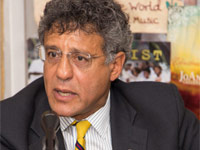Minister of State for Finance, Zhivargo Laing, has appeared before the World Trade Organisation (WTO) Geneva, Switzerland to lay out the Bahamas’ case for membership in that body.
He emphasised the Government’s commitment to WTO membership and its desire to conclude negotiations “within a timely period in a manner that enhances our natural development and positively supports our further integration into the global economy.”
He was addressing the first meeting of the Working Party responsible for The Bahamas’ accession, on September 14. Minister Laing was accompanied by Raymond Winder, who has been appointed Chief Negotiator for the accession process by the Government; Joshua Sears, Director General, Ministry of Foreign Affairs; Simon Wilson, Director, Economic Planning, Ministry of Finance; Frank Davis, Consul, Bahamas High Commissioner, United Kingdom; and Mark Sills, Trade Consultant.
The purpose of the meeting was to initiate the discussions concerning the accession of The Bahamas to the WTO. Nine years ago Minister Laing appeared before the General Council to present The Bahamas’ official request for WTO membership
The Government has made WTO accession an important component in its programme of national economic development and looks forward to concluding its negotiations on WTO accession in an orderly and timely manner,” said Mr Laing. In July the Government hosted the Chairman of the Working Party, Ambassador Peter Black; the Director of the Accessions Division, Chiedu Osakwe; and the Secretary of the Working Party, Sajal Mathur.
During that visit they met with the Prime Minister and Minister of Finance, the Rt Hon Hubert Ingraham; the Deputy Prime Minister and Minister of Foreign Affairs, Brent Symonette; the Leader and members of the Official Opposition, senior government officials, private sector stakeholders and civil society
The Government viewed this visit as a very important part of the dialogue in our accession process,” said Mr Laing
The Government has already done considerable work and has begun reforming laws governing both foreign and internal trade, bringing practices into compliance with the rules of the WTO,” said Mr Laing
We have also commenced a programme of legislative reform which is largely self funded and involves the engagement of consultants from many WTO member countries
This programme, among other things, will see the introduction of new WTO compliant Customs legislation, amendments to existing intellectual property legislation, a foreign investment law, introduction of new rules governing technical standards and sanitary and phytosanitary standards, and the operation of a competition law regime.
“Additionally, on a best effort basis, all future legislation will be WTO compliant and draft legislation will be published in sufficient time before enactment to allow for comments from interested parties.
“These reforms, once implemented, will to a large degree result in considerably improved conditions of access for foreign suppliers of goods and services on a Most Favoured Nation basis and will correspondingly enhance the market access commitments that The Bahamas will undertake as part of its accession to the WTO.”
The Bahamas will also seek to become a signatory to the Government Procurement Agreement, once the WTO compliant revisions are made to existing legislation, he said.
“As a very open economy it has long been the policy of the Government to protect the right of legal entities to import and export authorised goods without arbitrary restrictions.
“We fully expect the Bahamian market for foreign goods and services to continue to grow from current levels in line with the overall continuing growth and development of the Bahamian economy.
“We believe that improving our international trade prospects go hand in hand with improving our internal trade prospects. “To this end the Government has taken a series of initiatives aimed in their entirety at improving the ease with which business is done in The Bahamas,” said Minister Laing.
These include the passage of a new and modern Business License Act; implementing reforms that will ensure results based management within the public sector; utilising consultants from the Government of Singapore toward establishing a comprehensive programme to offer government services electronically, and developing a new, more relevant framework for supporting small and medium-sized businesses.
He noted that The Bahamas has been “seriously affected” by the global recession.
“We are currently compelled to deal with the economic and social implications of a soft economy with an unemployment rate of about 15 per cent and the adverse effect on the Governments financial resources, the latter having to be very carefully managed.
“We have taken steps to address this as evidenced by our May 2010 Budget, which introduced a broad range of expenditure reductions and a number of revenue measures.
“Given the current situation, we seek to balance our commitment to WTO accession with the firm recognition that small, vulnerable economies such as ours must accede to the WTO on terms that safeguard our growth and promote development,” said Mr Laing.
Gladstone Thurston
Bahamas Information Services



